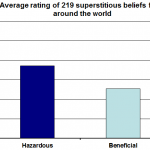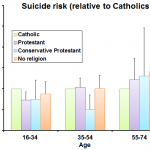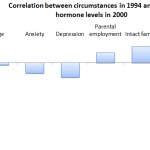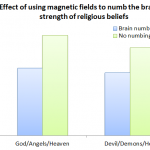There’s a well studied phenomenon called Terror Management Theory which basically says that, when people are reminded of their own death, their beliefs change in certain predictable ways. People cling more strongly to beliefs that make the future seem more controllable and comfortable – and that includes turning to religion (see: Religion, Patriotism and Death).
Bastiaan Rutjens (University of Amsterdam) has previously found that reminding people of death reinforces their belief in progress. What he wanted to find out was whether this holds for both religious and non-religious people.
So he and his colleagues ran an online survey on 276 people chosen to be representative of the Dutch population. Half were asked to write about what will happen to them when they die. The others were asked about dental pain – that’s a standard control used in these kinds of studies, designed to evoke a strong emotional response.
Then they asked them whether they though humanity will advance technologically. And also whether humanity will advance morally, ethically and socially.
The nonreligious were more likely than the religious to believe in technological progress.
Perhaps surprisingly, the nonreligious, Catholics and Protestants all had similar levels of belief in moral progress – although people who believed in mankind’s inherent sinfulness (mostly Protestants, in this sample) were likely to believe that morality will actually decline in the future.
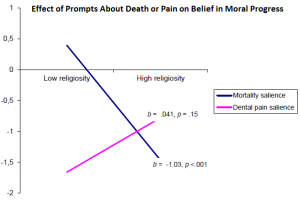 So what happens when you remind people about death? Well, it has no effect on belief in technological progress.
So what happens when you remind people about death? Well, it has no effect on belief in technological progress.
But reminding the nonreligious about death significantly increased their belief in moral progress.
Check out the graphic. What this shows is the result of a model based on the data.For people given death prompts (Mortality Salience in the graphic), belief in moral progress was much higher in those with lower than average strength of religious feeling (on the left hand side), compared with those high in religious feeling (on the right)
Prompts about dental pain had the same effect on both groups.
What this shows, Rutjens suggests, is that belief in progress can offer the nonreligious a buffer to existential threat similar to that offered by religious beliefs. But belief in progress in general is not enough – it has to be a belief that the essence of humanity will get better.
And what Rutjens and colleagues conclude from this is worth quoting in full:
From this perspective, the secularization of most western countries might in itself not lead to a better world6, but when people are motivated to search for existential meaning it at least triggers a motivated tendency to believe in a better world. Perhaps those adhering to or promoting a politics of progress can benefit from this idea, by providing people with the tools to find meaning in building a better future and seeking moral and societal progress.
![]() Rutjens, B., van Harreveld, F., van der Pligt, J., van Elk, M., & Pyszczynski, T. (2014). A march to a better world? Religiosity and the existential function of belief in social-moral progress The International Journal for the Psychology of Religion, 1-33 DOI: 10.1080/10508619.2014.990345
Rutjens, B., van Harreveld, F., van der Pligt, J., van Elk, M., & Pyszczynski, T. (2014). A march to a better world? Religiosity and the existential function of belief in social-moral progress The International Journal for the Psychology of Religion, 1-33 DOI: 10.1080/10508619.2014.990345
 This article by Tom Rees was first published on Epiphenom. It is licensed under Creative Commons.
This article by Tom Rees was first published on Epiphenom. It is licensed under Creative Commons.

